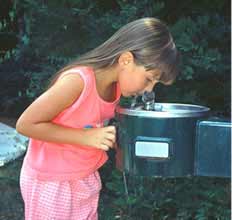Saying the cost of natural-gas development could outweigh the benefits, Pennsylvania's two highest-ranking environmental officials built a case Monday for imposing more taxes and regulation on Marcellus Shale exploration.
John Hanger, secretary of the Department of Environmental Protection, told a gas-policy conference here that it was time for the state legislature to impose a production tax on gas operators - who, he said, "are almost laughing at their good fortune at not having to pay a severance tax."
..."Quite frankly, the citizens of this state are being played for chumps," Quigley said.
DEP's Hanger ridiculed the state's 1984 law requiring gas operators to set aside a "pitiful" $2,500 insurance bond to pay for plugging an abandoned well. It costs the state about $10,000 to seal off an orphaned well.
"We need to protect the water," Gov. Corbett said.
Pennsylvania regulators on Tuesday called on Marcellus Shale natural gas drillers to stop sending wastewater to 15 treatment plants, citing an increased risk of contaminating public drinking water.
The Department of Environmental Protection's action, while voluntary, will likely set the stage for a formal ban on the discharge of inadequately treated wastewater into the state's rivers...
DEP's announcement came the day after Corbett, who has been criticized for his close ties to drillers and his refusal to support a gas-production tax, assured local officials he would not allow the industry to "poison the water."
"We need to protect the water," the governor, a Republican, said at a meeting of the Pennsylvania State Association of Township Supervisors. "But we must do it based on science, not emotion."
...The DEP and the industry appear to have been influenced by complaints from public water suppliers in Western Pennsylvania, which say they are challenged by bromide levels whose concentrations have increased concurrently with the drilling boom.
The bromides themselves are not a public health risk - they account for a tiny part of the salty dissolved solids that create an unpleasant taste in water at elevated levels.
But bromides react with the chlorine disinfectants used by drinking water to form brominated trihalomethanes (THMs), a volatile organic compound.
See: Carbon County Groundwater Guardians | Pennsylvania
Studies have linked the prolonged ingestion of high levels of THMs to several types of cancer and birth defects.
Officials at several water authorities in the Pittsburgh area say their facilities have failed several tests for trihalomethanes in recent years.
See: Despite overhaul, gas wastewater still a problem








